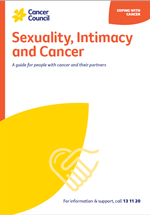- Home
- About Cancer
- Managing side effects
- Sexuality, intimacy and cancer
- Overcoming specific challenges
- Changes in ejaculation
Changes in ejaculation
After surgery for prostate cancer, you will not produce semen. This means that you will have a dry orgasm, which can feel quite different – some people say it does not feel as strong or long-lasting as an orgasm with semen, while others say it is more intense. Sometimes surgery causes semen to go backwards into the bladder, rather than forwards out of the penis. This is called retrograde ejaculation. This is not dangerous or harmful, but it does mean you will be infertile.
In some cases after prostate surgery, you may leak a small amount of urine during ejaculation (this is not harmful). If you are feeling anxious about your sex life, premature ejaculation can also be a problem.
Tips for adapting to ejaculation changes
- Discuss the changes with your partner and reassure them that it doesn’t affect your enjoyment of sex. Include lots of foreplay to increase your satisfaction.
- Empty your bladder (urinate) before sex to minimise urine leakage. If you or your partner are worried, you can use a condom or constriction ring (available from sex shops) at the base of the penis to catch any leakage. Pelvic floor exercises can help improve bladder control.
- Ask your doctor about medicines or numbing gels, or talk to a sex therapist about the stop–start technique.
- Focus on enjoying sexual activity. Worrying about controlling your ejaculation may lead to erection problems or loss of interest in sex. Consider counselling to help ease your anxiety.
→ READ MORE: Difficulty reaching orgasm
Podcast: Sex and Cancer
Listen to more of our podcast for people affected by cancer
More resources
Dr Margaret McGrath, Head of Discipline: Occupational Therapy, Sydney School of Health Sciences, The University of Sydney, NSW; Yvette Adams, Consumer; Dr Kimberley Allison, Out with Cancer study, Western Sydney University, NSW; Andreea Ardeleanu, Mental Health Accredited Social Worker, Cancer Counselling Service, Canberra Health Service, ACT; Kate Barber, 13 11 20 Consultant, Cancer Council Victoria; Dr Kerrie Clover, Senior Clinical Psychologist, Psycho-Oncology Service, Calvary Mater Newcastle, NSW; Maree Grier, Senior Clinical Psychologist, Royal Brisbane and Women’s Hospital, QLD; Mark Jenkin, Consumer; Bronwyn Jennings, Gynaecology Oncology Clinical Nurse Consultant, Mater Health, QLD; Dr Rosalie Power, Out with Cancer study, Western Sydney University, NSW; Dr Margaret Redelman OAM, Medical Practitioner and Clinical Psychosexual Therapist, Sydney, NSW; Kerry Santoro, Prostate Cancer Specialist Nurse Consultant, Southern Adelaide Local Health Network, SA; Simone Sheridan, Sexual Health Nurse Consultant, Sexual Health Services – Austin Health, Royal Talbot Rehabilitation Centre, VIC; Prof Jane Ussher, Chair, Women’s Heath Psychology and Chief Investigator, Out with Cancer study, Western Sydney University, NSW; Paula Watt, Clinical Psychologist, WOMEN Centre, WA.
View the Cancer Council NSW editorial policy.
View all publications or call 13 11 20 for free printed copies.
Need to talk?
Support services
Coping with cancer?
Speak to a health professional or to someone who has been there, or find a support group or forum
Life after cancer treatment
Webinars, exercise and nutrition, sexuality programs, and back-to-work support
Cancer information
Your coping toolbox
Strategies for managing difficult situations during and after cancer treatment
View our publications
Guides and fact sheets for people with cancer, their families and friends

